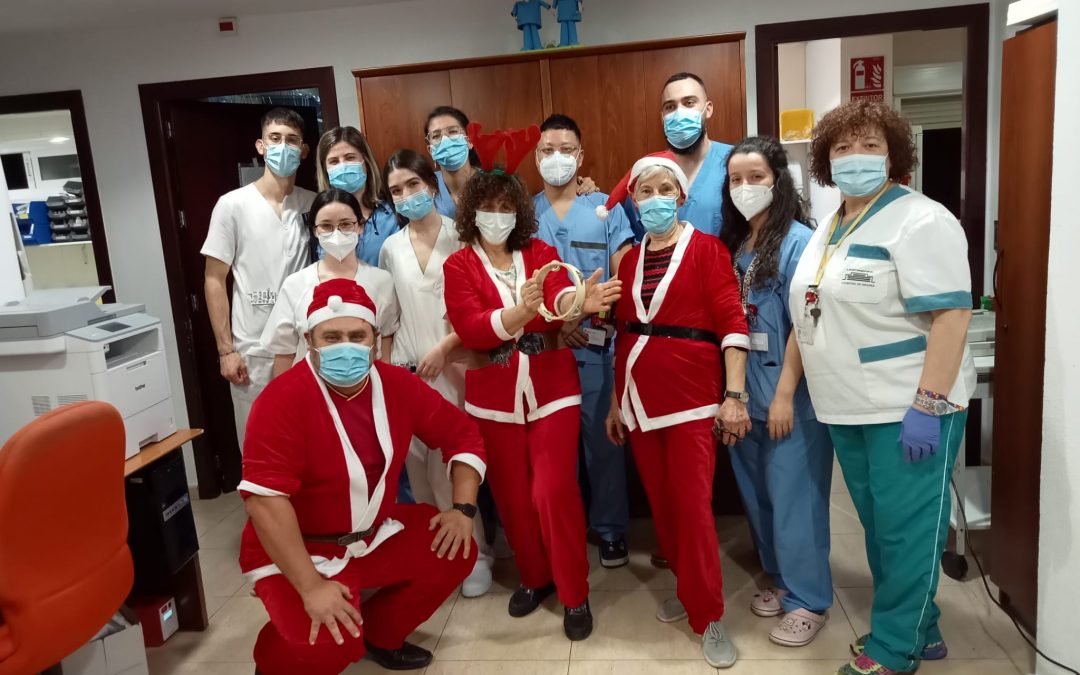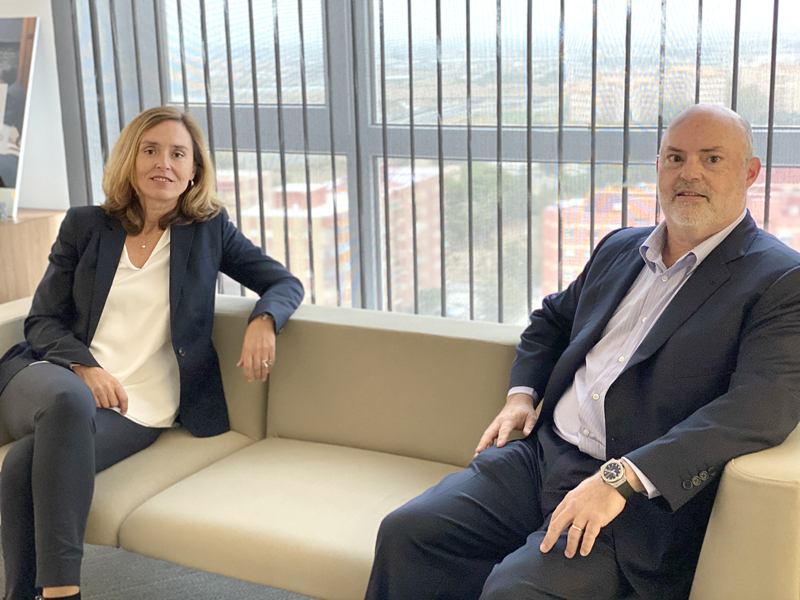
by S0p0rt3 | Jan 17, 2023 | Ribera |
- The group’s health centres organise Christmas decoration competitions, special menus, workshops with patients, children’s parties and even an intergenerational living nativity scene.
- Its professionals are involved in collecting toys, Christmas entertainment, organising concerts and games for chronically ill and hospitalised patients and participating in corporate volunteering days for charities
The Ribera healthcare group is once again turning its attention to its patients at Christmas, thanks to the involvement and support of its professionals, who organise Christmas decoration competitions, special menus, workshops, children’s parties, art exhibitions, nativity scenes and Christmas trees and even an intergenerational living nativity scene which, in this case, is taking place at the Ribera Povisa hospital (Vigo). In addition, throughout this week and the next two, the classic visits of sportsmen, clowns, firemen, children’s characters, Father Christmas and the Three Wise Men to the paediatric wards will take place in most of the centres, to liven up the stay or the consultations of the little ones. The aim, as part of the humanisation plans of the Ribera hospitals, is to try to make patients live and feel the spirit of Christmas, even when they go for a consultation at this time of year, are admitted or spend many hours in the health centre for treatment, such as dialysis or chemotherapy.
Most of these actions are possible thanks to the strong involvement of the group’s professionals in personalised, humanised and quality healthcare, which undoubtedly improves the patient’s experience. In fact, the Christmas decoration competitions between departments of the same hospital aim to give special value to this action that spontaneously arises in each work area. The Vinalopó University Hospital and Denia Hospital have both organised children’s parties, and the latter will also receive a visit from a school in La Xara to sing Christmas carols at the centre.
In addition, this Christmas the Ribera Group has once again made a donation of essential health material and is organising a food collection for the Federation of Ukrainian Associations in Spain and the Spanish-Ukrainian Chamber of Commerce, which helps families from this country displaced by the war, as well as those who remain there. It has also promoted corporate volunteering in many of its work centres, involving professionals in the collection of toys, as in the case of Ribera Juan Cardona with the association Dignidad Galicia, in Ribera Hospital de Molina, with the donation of food for Caritas or the delivery of toys and food by Futurs workers for the Red Cross, as well as in voluntary assistance to the facilities of Casa Caridad in Valencia or Caritas in Elche, to help in the preparation of batches of products for needy families.
The professionals of the Ribera Group also get involved voluntarily in activities and actions to improve the stay of patients at this time of year. For example, at Torrejón Hospital, a craft workshop has been organised to decorate the Christmas tree and a quiz for dialysis patients; a professional at Vinalopó Hospital (Elche) plays the piano at the Day and Dialysis Hospital to brighten up the patients’ stay at the centre, and in Torrejón and Denia micro-concerts have also been organised, while at Ribera Hospital de Molina, Christmas carols are planned.
Finally, several of the Group’s hospitals have also held their respective patient councils at this time to congratulate the patients’ associations on the festive season and the New Year, to take stock of the year and to prepare for the new year, in which involvement and collaboration with these organisations will once again be at a maximum.

by S0p0rt3 | Jan 17, 2023 | Ribera |
- In addition, the healthcare group has launched a Radiology Ring and a Heart Area in 2022 which, together with the Breast Area, confirm the strategy of super-specialisation of its professionals and inter-hospital collaboration to guarantee the best care for patients.
- It maintains its commitment to telemedicine and the application of AI to remote patient care, reinforces its Corporate Social Responsibility policy and resumes after the pandemic the Cervantes Way, workshops, talks and conferences, as well as face-to-face patient counselling, among other activities.
The Ribera healthcare group ended 2022 with 13 hospitals, 64 primary care centres and 35 polyclinics, having added three projects in the past year: the Virgen de la Caridad hospital group in Murcia; the Cascais hospital in Portugal; and participation in the launch of the first public-private management hospitals in the Middle East, specifically in Kuwait.
2022 has been a year of growth, but also of transformation for the Spanish group based in Valencia and present on three continents: Europe, Latin America and Asia. After naturally facing the change of its reference shareholder and sealing its alliance with Vivalto Santé, the third largest private healthcare group in France, Ribera’s trajectory has laid the foundations for the creation last year of the Ribera Foundation, which aims to help improve people’s overall health, wellbeing and quality of life, reinforcing the tools to promote, even more if possible, its Corporate Social Responsibility (CSR) policy. In addition, it has consolidated all its specialised services, specifically the laboratory (Ribera Lab), already integrated in most of its hospitals, dental (Ribera Dent) and aesthetics (Ribera Estética) divisions, both with clinics in Lugo and Molina de Segura (Murcia).
In addition, last year the healthcare group confirmed its commitment to the super-specialisation of areas and professionals and inter-hospital collaboration, and launched its Radiology Ring, with some of the best specialists by organ-system in Spain and from eight of its hospitals, as well as a Heart Area (with professionals from five hospitals), both with procedures and structure similar to those that enabled the organisation of its Breast Area, which is about to celebrate its third anniversary. The growth, improvement and expansion of units and consultations for better patient care are constant in the Group’s different healthcare centres, although the new Child and Adolescent Psychiatry and Psychology Unit at Ribera Povisa (Vigo), the new Mental Health inpatient ward at Hospital Universitario de Torrejón and the in-hospital Palliative Care Unit at Hospital Universitario del Vinalopó (Elche) stand out for their importance.
Innovation, technology and infrastructures
In 2002, the Ribera healthcare group maintained and extended its collaboration with Lanzadera, Juan Roig’s accelerator, in its firm commitment to co-innovation and teamwork with start-ups in the healthcare sector. All this to gain in agility when it comes to launching applications and platforms aimed, above all, at remote patient care. Telerehabilitation and neurorehabilitation, as well as digital dermatology and Lola, our virtual caregiver, have played a prominent role in the past year. The data centric model and the application of Artificial Intelligence (AI) to telemedicine and its predictive models are, without a doubt, two key axes of the group’s innovation policy in which Ribera’s technology company, Futurs, leads the way, from its IT development, strategic consulting and operations areas. 2022 was the year in which Futurs invested in “virtual biopsy” software for a more accurate diagnosis of breast cancer with AI, among other major milestones. Another highlight was the implementation of the new geolocation and real-time information system at Torrejón University Hospital, MySphera, for relatives of surgical patients and their families, included in the group’s YOSalud portal.
With regard to the new technological equipment incorporated, the mammographs at Denia Hospital and Ribera Polusa Hospital (Lugo), the digital mammograph at Ribera Hospital de Molina, the latest-generation PET-CT scanner at Ribera Povisa Hospital and the neuronavigator for operating on brain tumours at Denia Hospital are particularly noteworthy. Also the new automation system known as ATELICA, from Ribera Lab, with the capacity to analyse 800 tubes per hour. The most outstanding infrastructure work in 2022 was the completion of the renovation work on the new façade of Ribera Povisa, which has recovered the main entrance on Calle Salamanca, with a modern design and without architectural barriers. In addition, this hospital has renovated the first floor and has opened a new Extractions and Ophthalmology area.
Humanisation and “normality” post-Covid
Once most of the waves of Covid infections have stabilised, it has been possible to recover all the workshops, conferences, exhibitions and activities organised for patients in the hospitals, in the healthcare centres themselves or in schools and associations. In addition, patient councils in all hospitals have once again become face-to-face and Ribera Juan Cardona (Ferrol) and Denia hospital have launched this advisory body in 2022, made up of the main patients’ associations, which meets periodically with the management of the respective hospitals. Professionals from the group have taught thousands of children the Ribera song to learn how to perform Cardiopulmonary Resuscitation (CPR), Torrejón Hospital has recovered the Camino de Cervantes and the group has published the first children’s story to help children control sugar consumption, especially those suffering from diabetes.
The group’s Humanisation programme has come a long way in 2022. The Hospital Universitario del Vinalopó is now the only health centre in Spain adapted for the hearing impaired; the Hospital de Dénia has launched a Care Plan for patients with severe functional diversity which is already operational in Vinalopó; Ribera Hospital de Molina has implemented the protocol to allow pets to visit patients; and all Ribera hospitals have committed to music therapy with workshops and live performances and the group’s new Spotify channel, with playlists adapted to patients, families and professionals and a health podcast. In addition, corporate volunteering has been boosted and for the first time, in addition to the special actions and collaborations at Christmas and summer, professionals from the group have walked the Camino de Santiago with Discamino.
People Policy
The professionals of the Ribera Group always place the patient at the centre of their activity. For this reason, the group does the same with its professionals and works on a people management policy that attracts and retains talent, vocation and professionalism. Along these lines, Ribera and union representatives from Vinalopó and Denia have agreed to significant improvements in the working conditions of its professionals in 2022 in new collective bargaining agreements. At Ribera Povisa, a “bridging agreement” has been signed with the works council for the next collective bargaining agreement. The commitment to stable employment has been a constant in the year that has ended and hospitals such as Ribera Povisa, Ribera Juan Cardona or Denia, among others, have witnessed dozens of professionals signing permanent contracts and reinforcing their workforces in summer. This policy is undoubtedly what has led Ribera, for yet another year, to be placed among the 50 best companies to work for, according to the Actualidad Económica ranking.
Teaching and research
In 2022, Ribera hospitals have offered a total of 65 MIR and 14 EIR positions in 13 specialties, with a very ambitious and complete training and career plan. In addition, the Vinalopó University Hospital has “graduated” its first class of residents trained in the health department. The year also saw the accreditation of the Cardiology and Radiodiagnosis departments of the Vinalopó University Hospital as Teaching Units to train resident doctors next year, and the group has signed an agreement with the University of Alicante and the UCH- CEU to have Health Science students on work experience in 2023 in the two departments it manages in the Valencian Community.
2022 was another important year in the area of Research. Ribera Povisa was the Spanish hospital that included the most patients in the clinical trial of the Moderna flu vaccine and, through the Hospital de Torrejón, Ribera participated in a European research study on digital dermatology. This same hospital has launched a research study on neuropsychological telerehabilitation for the treatment of chronic migraine and is at the forefront of pregnancy research, with 37 clinical studies underway in the Obstetrics service in key areas such as complications of genetic origin, pre-eclampsia, gestational diabetes and premature birth. For its part, the Dénia Hospital has participated in a study on pocket ultrasound for the detection of cardiac infections and in a European project on pancreatic cancer. And these are just a few examples.
Recognition and quality
The year that has just ended has also been very prolific in terms of public recognition and quality accreditations for services, hospitals and professionals of the Ribera healthcare group. In fact, it has achieved the Joint Commission International Enterprise accreditation, thus joining the exclusive group of healthcare organisations with this prestigious seal of quality. Along these lines, Cardiac Surgery at the Hospital Universitario del Vinalopó was the first service of its kind to achieve Joint Commission International. The Joint certifications already obtained have been renewed, as well as those of carbon footprint in several hospitals, which recognise the commitment to the environment.
In terms of awards, 2022 was a brilliant year for Ribera. It achieved three TOP20 awards for the best overall management for its Torrejón, Vinalopó and Denia hospitals and seven TOP20 awards in different areas of these same hospitals, and Ribera Povisa Hospital repeats yet another year in the ranking of the 50 best private hospitals in Spain, according to the renowned Merco report. In addition, Ribera Hospital de Molina and Denia hospital have obtained the QH quality mark for care processes, and the Futurs technology company has won the 2nd edition of the Isaac Peral National Research, Science and Innovation Awards. Projects such as the “blank campaign” on suicide, the pet companion programme, the virtual carer Lola and the CPR song have received various awards and acknowledgements from organisations and media in the health, communication and marketing sectors.



Recent Comments